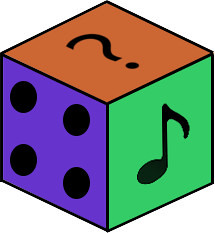
- Accompanist (role)
- Ad libitum
- Agenda
- Aleatoricism
- Aspect
- Balance
- Bartle types
- BCG
- (Cognitive) flow
- Conductor (role)
- Constellation
- Constructor (role)
- Co-optionality
- Cue cards
- Dice
- Dimension
- Downbeat
- Downtime
- Elegant Game
- Emergence
- End Condition
- Event (musical event)
- Extended technique
- Facilitator
- Fighting
- Flow
- Found sound
- Gameplay flow
- Genre
- Heteronomous Music
- Horizon of intent
- Improvisation rite
- Insert game
- Inspire cards
- Instrument Preparation
- Judge (role)
- Karaoke
- King-making
- Learning curve
- Ludomusical dissonance
- Meaningful Choice
- Mechanic
- Music game
- Non-idiomatic music
- Notation Cards
- Open work
- Parameter
- Pervasive Game
- Player (role)
- Prompter (role)
- Psychographics
- Quarterbacking
- Rhythm cards
- Rhythm game
- Roles
- RPG
- Rule Cards
- Speedrun
- Stacking
- Trading
- Transition
- Upgrade
- Victory condition
- Xenochrony
- XP
- Yes, and...
This glossary entry is a draft. You can help by editing it or discussing in the comments
Method of improvising when you accept everything that is played and do something with it.
Usage
In improvisational theatre, Yes, and… method of advancing the scene is often encouraged as a general mind-set. Although obviously, you don't need to follow a Yes, and… principle blindly, but depending on your inclinations you might sometimes step back to leave space for other ideas to evolve on their own.
In music, you also may choose to allow for juxtapositions and strong contrast, but if you want to join for coherence, Yes, and… is a call to adjust to others (not to bully them into your own music) but at the same time to be constructive with the material (not to leave partners with all the hard work and responsibility). It's worth noting that in the context of music Yes-anding works better the less people are in play.
Jeffrey Agrell's compendium includes Yes, And as a game of its own with just a broad description of the concept, albeit stressing more the supportive aspect rather than developmental.
Many music games provide just a general frame for collective improvisation, at Games for Music we may focus also on improvisation itself. So join us in writing about it! :)
If you think anything should be added to this subpage, please drop a hint or a link for future editors.
